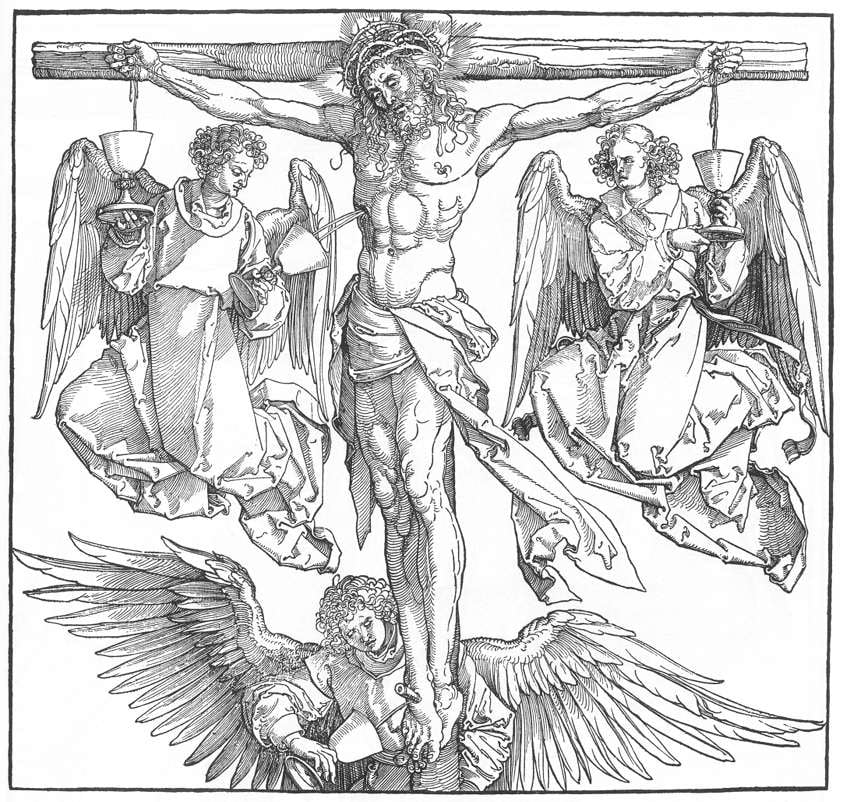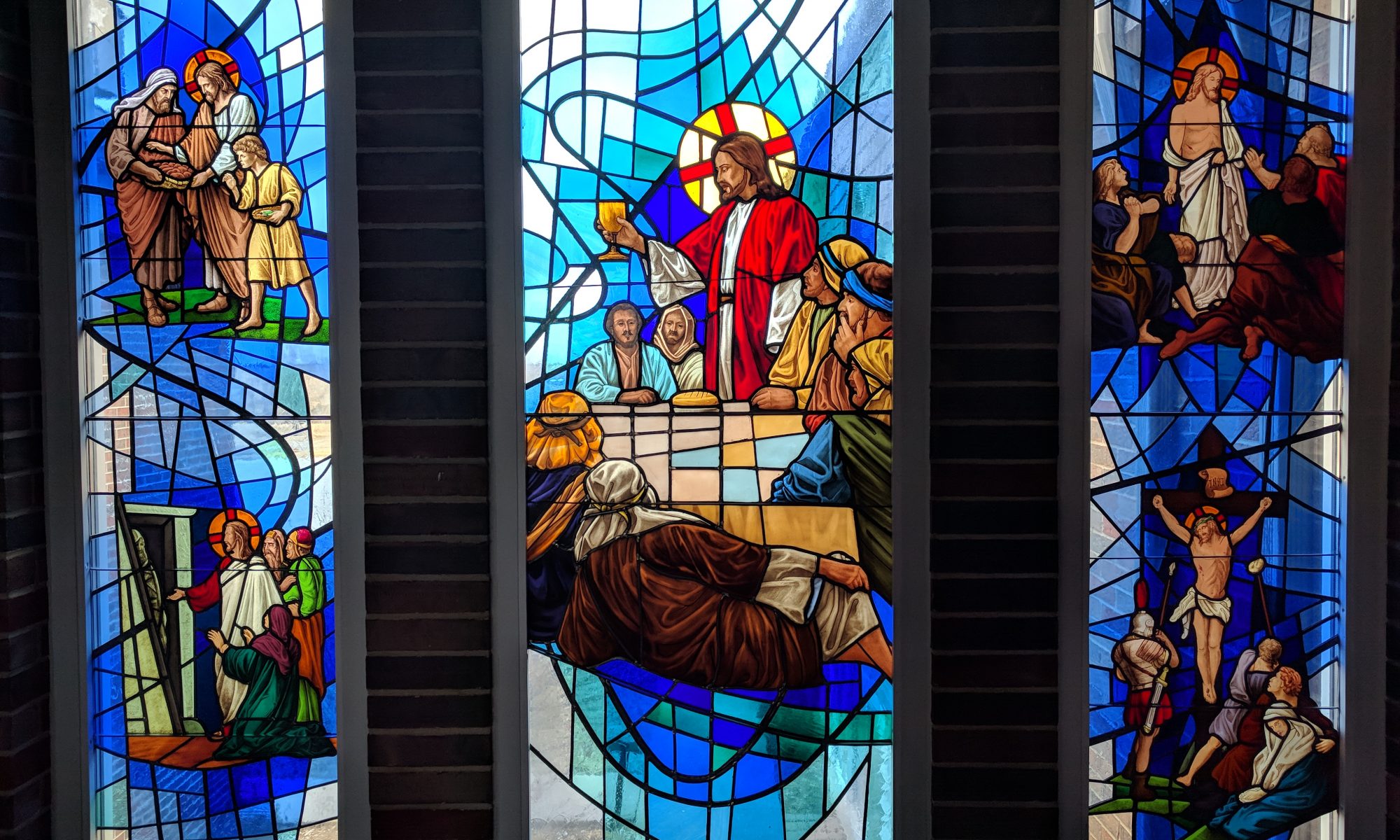
Lessons: Exodus 24:3-11, 1 Corinthians 11:20-32, John 13:1-15
Hymns: LSB 623, 617, 445, 452
Grace, mercy, and peace to you from God our Father and our Lord and Savior, Jesus Christ. Amen.
When John the Baptist was conducting his ministry to prepare the way of the Lord, he preached Christ. One day John saw Jesus coming toward him and John rightly confessed, “Behold, the Lamb of God who takes away the sin of the world!” (John 1:29). These words have significant meaning. They are so important that they made their way into the liturgy. When we sing the Agnus Dei, we sing, “Lamb of God, Thou takest away the sin of the world, have mercy upon us.” We sing these words after the Words of Institution are spoken and before you are ushered forward to receive the Body and Blood of Jesus in the Sacrament. When those simple Words of Institution are spoken, we believe, teach, and confess that Christ Jesus has joined His Body to the bread and His Blood to the wine so that when we Commune, we eat His very Body and drink His true Blood for the forgiveness of sins.
To be called the Lamb of God who takes away the sin of the world is to called the very one who will die for the sin of the world. You see, in Old Testament times, lambs were offered as sacrifices to God. Animals died to indicate life is being granted by God through the shedding of blood.
When Adam and Eve sinned, they tried to make coverings for themselves from plants. After God visited with them (not only confronting them for their sin, but also promising to them the Messiah who will atone for their sin), God made tunics of skin to serve as their clothing. The first animal died.
After Cain and Abel were grown, they offered sacrifices to God. Abel’s offering was of the firstborn of his flock of sheep. After God saved Noah, his family, and all creation through the ark, Noah offered burnt offerings to God from the clean animals that were on the ark. When Abraham’s faith was tested and he was told by God to offer his only son, Isaac, on a mountain that will later become Jerusalem, Abraham bound up his son on the altar as God directed, raised His knife, and was ready to slay his son—all because God told him to do so. In faith, he was listening to God’s instruction. But suddenly God stopped him and provided a ram to die in Isaac’s place.
When God raised up Moses to deliver God’s people from slavery in Egypt, Pharoah refused to let God’s people go even after nine devastating plagues. Finally, God sent the tenth plague—death to the firstborn in all Egypt. Yet God’s angel passed over the Israelites. Why? Because each family killed a lamb and spread blood from the lamb on their doorposts. They ate the meat and were ready to flee. It was the Lord’s Passover. Every year, God’s people continued to celebrate the Passover Feast. It not only reminded them of the deliverance God accomplished as the Israelites were set free from slavery and were brought into the Promised Land, but it also taught them that a Passover Lamb would one day die for the sins of the world—God’s Anointed.
Jesus is that Passover Lamb. When John the Baptist said, “Behold, the Lamb of God who takes away the sin of world,” he was saying Jesus is the Passover Lamb who was sent by God to die to make atonement for all people.
All the animal sacrifices throughout the Old Testament era pointed ahead to the sacrifice Jesus would make on the cross.
John the Baptist was right. Jesus is that Lamb. He takes away sin. That He can do so is demonstrated by His own ministry. He proved that Satan and all demons had no power over Him, as Jesus drove out demons. Jesus undid the effects of sin by giving sight to the blind, helping the lame walk, and healing the sick of their various diseases. Jesus proved that even the grave had no power over Him as He raised the dead, like the widow’s son at Nain and Lazarus. Remember the wages of sin is death, and now you have a Man who can defeat death and bring people back to life.
Jesus even forgave sins. He forgave the paralytic, saying, “Son, your sins are forgiven you” (Mark 2:5). The scribes took offense and accused Jesus of blasphemy, thinking only God can forgive sins. And so Jesus said, “Why do you question these things in your hearts? Which is easier, to say to the paralytic, ‘Your sins are forgiven,’ or to say, ‘Rise, take up your bed and walk’? But that you may know that the Son of Man has authority on earth to forgive sins”—he said to the paralytic— “I say to you, rise, pick up your bed, and go home.” And he rose and immediately picked up his bed and went out before them all, so that they were all amazed and glorified God, saying, “We never saw anything like this!” (Mark 2:8-11).
Jesus is, after all, the Lamb of God who takes away the sin of the world!
Then, on this night (just days after Jesus rode into Jerusalem on a donkey), Jesus was ready to celebrate the Passover with His disciples. He sent two of his disciples and said to them, “Go into the city, and a man carrying a jar of water will meet you. Follow him, and wherever he enters, say to the master of the house, ‘The Teacher says, Where is my guest room, where I may eat the Passover with my disciples?’ And he will show you a large upper room furnished and ready; there prepare for us.” And the disciples set out and went to the city and found it just as he had told them, and they prepared the Passover (Mark 14:13-16).
He had gone to Jerusalem to celebrate the Passover previously, as was commanded by the Old Testament Ceremonial Law. Perhaps one of the most famous times was when Jesus was twelve years old. After the feast it was time to return to Nazareth, but Jesus was not found among those traveling back. It took days before Mary and Joseph found Jesus. He in the Temple with the church leaders, who were astonished at His understanding and answers.
But this time the celebration of the Passover is obviously different. Palm Sunday demonstrates that. The crowds recognized Him as their Savior by singing hosanna—save now. Judas had agreed to betray Jesus for 30 pieces of silver. Jesus knows He is going to sacrificed as the Passover Lamb the following day.
While they were eating the Passover feast, Jesus said, “I have earnestly desired to eat this Passover with you before I suffer” (Luke 22:15). Then He took bread, broke it, blessed it, and gave it to His disciples, saying, “Take eat; this is My Body.” Then He took the cup of wine and declared, “Drink from it, all of you. For this is My Blood of the new testament, which is shed for you for the forgiveness of sins.”
The disciples received the Body and Blood of Jesus, just as He said. In this, Jesus instituted the Sacrament of the Altar.
Because Jesus fulfilled the Old Testament Ceremonial Law, the annual observance of the Passover is no longer required. We are no longer instructed to slaughter lambs.
Instead, the Lamb of God was offered on the altar of the cross. He bore our sins in His Body and offered the ransom payment for our every last sin. He gives us the fruits of this sacrifice in the Lord’s Supper.
This feast continues to be the Body and Blood of Jesus for our forgiveness. After all, Jesus described it as His testament. God’s Word teaches us that a testament comes into force upon the death of the testator and then always remains true (Hebrews 9:15-22). Jesus died as the Lamb of God on Good Friday, guaranteeing that this Sacrament is always going to be what He said it is.
And so when you come forward this evening, you are not simply reenacting a historic event or receiving some trivial niceties. Instead, you are receiving the Body and Blood of Jesus for your forgiveness.
What sins have you committed that you keep on wondering, “Why did I do that?” What sins are others trying to hold against you? What ways have you violated the Ten Commandments? How have you failed to keep God’s Law? Repent.
They are forgiven. These sins can no longer accuse you. Jesus does not accuse you. He paid for your sin. So gather in His house to receive the Lord’s Supper for the forgiveness of your sins.
And as you receive this Sacrament, remember what Jesus did to give you this precious meal. He died on the cross out of love for you.
When He gave the disciples Holy Communion that first time, Jesus was preparing them to bear the crosses that would come up in their lives. They would watch their Lord be crucified. They themselves would suffer persecution for being faithful—even martyrdom. And these Christian were being prepared to die—ready to depart in peace.
The peace of God is granted to us in the Lord’s Supper. And Jesus, too, is preparing us to face our crosses in confidence, knowing that Christ Jesus will be with us and our sufferings are experienced by the brotherhood throughout the world. Christ is preparing us to depart in peace and meet Him in glory where we will experience a feast of victory like no other. So come and feast on the Body and Blood of Jesus. Amen.
The peace of God which passes all understanding keep your hearts and minds in Christ Jesus to life everlasting. Amen

